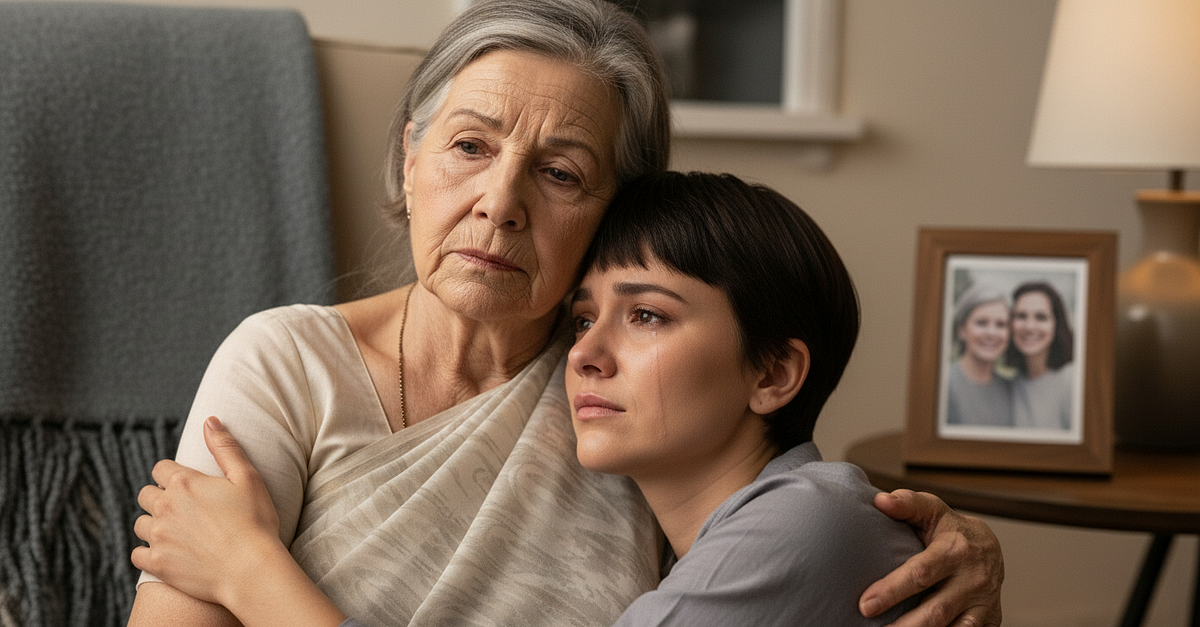When My Mother Forgot My Name. “Have you ever held a loved one in your… | by Angana Rajapakse PhD | Oct, 2025

“Have you ever held a loved one in your arms and realized they no longer know you? I did, with my mother, and it changed me forever.”
I still remember the moment she looked at me with a polite smile — the kind you give to a stranger. My mother, the woman who raised me, who loved me fiercely, no longer knew who I was. She didn’t call me by my name. She didn’t recognize my face. And yet, in that small, polite smile, there was a trace of warmth, a flicker of the woman I had always known.
It is strange, how someone can be so present and yet so far away. Alzheimer’s, I would learn, is not just the slow theft of memory. It is the subtle erasure of identity, a gradual fading that leaves fragments of a life behind. And yet, in the midst of that, love — stubborn, fierce, unyielding — remains.
When I look back, I see her not only as she was in the final stages but as the vibrant, radiant woman who shaped my entire life. And I see myself, the only child, navigating the slow, heartbreaking process of witnessing her fade.
The Woman I Knew
Before Alzheimer’s touched her, my mother was a force of nature. A head nurse in her professional life, she tended to everyone around her, from patients in hospitals to neighbors at home. She had an unshakable energy, a kindness that radiated effortlessly. Whenever someone was sick, she would be there — not because it was expected, but because it was her instinct.
She was beautiful, yes, but her beauty was more than the surface. It was her presence, her laughter, the way she remembered small details, the way she made everyone feel seen and cared for. She volunteered at my school, helped with my homework, celebrated every small victory I had, and comforted every little failure. She shaped me, in every way, into the person I became.
Even now, I can picture her vividly: standing in the courtyard of my school, encouraging the children, talking to the mothers, her smile lighting up the afternoon sun. She was a woman of action and warmth, a presence that people relied upon and admired.
The Distance Between Us
When I left India to pursue my PhD in Switzerland, life felt manageable. My parents stayed behind, and I called my mother every other day. After my father passed away, she lived alone with a caretaker. At first, everything seemed fine. But slowly, almost imperceptibly, I noticed a shift.
She began speaking about events from the past as if they were present, often confusing reality with memory. She would speak of neighbors who hadn’t lived nearby for years, or of meals she had cooked decades ago. Sometimes, she invented little stories, things that had never happened at all.
At first, I tried to dismiss it — attributing it to loneliness, age, fatigue. But I could not ignore the pattern. As a scientist, I recognized the signs. I understood the implications of Alzheimer’s on personality, cognition, and memory. And yet, knowledge offered little comfort. Knowing the likely path of the disease did not prepare me for the emotional devastation that would follow.
The Diagnosis
Returning to India, I took her to see a doctor. Alzheimer’s. The word fell heavy in the room, heavy on my chest. I knew what it could do — the gradual dismantling of personality, the fading of identity — but seeing it confirmed, written on paper, made it painfully real.
I was the only child. With my father gone, she had no one else. I could not leave her alone. And so, the decision was made: I would take her with me to Switzerland. There, my husband and I could care for her together. It was a choice born of love, but also of inevitability.
It was both relief and fear. Relief, because she would not be alone. Fear, because I understood the enormity of what lay ahead. Alzheimer’s would change everything — our routines, our independence, our lives — and there was no turning back.
Switzerland: Cherries, Rivers, and Laughter
The early days in Switzerland were filled with fragile hope. I remember plucking cherries in the valleys, their sweet smell mingling with the crisp mountain air. We laughed at small things — a playful argument over who could pick the bigger cherry, the way she tried to chase a butterfly and nearly fell over, and her radiant smile that made the world seem lighter.
We went to the riverside for barbecues, sitting on blankets as the water shimmered under the sun. She loved those moments, I think, though memory no longer anchored her firmly in the present. There was joy, fleeting and precious, and I clung to it.
We would sit for hours, sometimes talking, sometimes silent. In her silence, I felt her presence more strongly than words could convey. There was comfort in knowing she was near, even if she did not know me as her daughter anymore.
The Slow Fade
Alzheimer’s is patient. It does not rush, but it does not relent. Gradually, she became less independent, unable to perform basic tasks we once took for granted: dressing, cooking, even simple routines like brushing her hair or pouring tea.
I took leave from my studies to be with her full-time. I helped her through every day, every meal, every bath, every difficult morning. It was exhausting. It was heartbreaking. And yet, I never considered leaving. I could not imagine letting her face the disease alone.
Each day brought new challenges. There were mornings when she refused to get out of bed, insisting that the day belonged to her “other life” in the past. There were evenings when she would become frightened, anxious, calling out for her father long after he had passed. I held her hands through it all, whispered reassurances, and simply remained present.
The Moment, I Lost Her
The hardest moments were the ones that broke silently. One day, she looked at me, her eyes searching, and said with conviction, “You are my younger sister.”
I felt my heart crack. The woman who had shaped my childhood, who had been my guide, my protector, my home, no longer knew I was her daughter. And yet… I did not correct her. I did not argue. I held her hand and smiled, playing along, because love does not require recognition. Love persists even when memory falters.
It was a strange kind of grief — the grief of losing someone who is still alive. There is no funeral, no finality, only the slow erosion of shared memories. Each day, a little more of her slipped away, and I had to accept that.
Moments of Grace
And yet, there were moments of grace. There were times when she would laugh unexpectedly at a joke I had not made, or hum a song I had not taught her, and for a brief instant, she was herself again. I would catch a flicker in her eyes, a recognition, and it reminded me that the essence of a person can survive even when memory cannot.
These were small victories, simple joys, but they were enough. They reminded me why presence mattered. Even if she could not remember who I was, she could feel my love. And that, I realized, was the truest measure of connection.
Living in the Present
Through it all, I learned the importance of living in the present. She may have forgotten my name, my face, our shared history. But I lived each day with her, fully, without regret, without clinging to the past. I spoke gently, laughed when she laughed, comforted when she cried.
Even as she faded, there were moments of clarity. A smile that seemed to say, I know you are here. A gesture, a laugh, a hug — all small reminders that the essence of a person cannot be stolen entirely by memory loss.
The Final Goodbye
Time continued its slow, relentless march. Alzheimer’s gradually took more from her — her independence, her memories, her recognition of me. And yet, even in those final days, there were flickers of her presence, small moments of grace that reminded me of the woman she had always been.
She finally passed away in Switzerland, surrounded by the quiet mountains, the river we had visited countless times, and the love of the family who had been by her side every step of the way.
In that moment, grief and relief intertwined — grief for the mother I had lost piece by piece, relief that she no longer suffered, that she could rest beyond the reach of the disease.
Reflections on Love and Memory
Her passing made me realize something profound: Alzheimer’s may steal memories, but it cannot erase the bonds we share. I carry her with me every day — in my choices, in my compassion, in the small acts of care I offer to others.
Even in death, her essence remains — vibrant, loving, and guiding. The woman who once cared for everyone in her neighborhood, who nurtured me, and who faced her final days with quiet dignity continues to shape who I am.
Alzheimer’s did not erase her essence. It did not erase our bond. It only reshaped it, forced me to see love in its purest form: not as recognition, but as presence, devotion, and care.
A Message to the World
If there is one thing I want the world to know, it is this: never leave someone alone in the journey of Alzheimer’s. Even when they are lost to the past, even when they forget your name, your presence matters. You are the tether to the present, the reminder of love, the bridge between memory and now.
The person may be fading, may remember nothing of the present. But you can live in the present with them. And in that shared existence, there is grace, there is dignity, and there is love beyond words.
Reflections on Time and Memory
In the end, memory is not the only measure of a life. My mother’s life was full, even as Alzheimer’s slowly erased the memories we shared. She loved, she gave, she touched lives, and she created a daughter who remembers her fully — not just in fragments, but in the totality of her being.
I learned to grieve while still living. I learned to let go without letting go of love. I learned to honor the woman my mother had been, while embracing the woman she had become.


